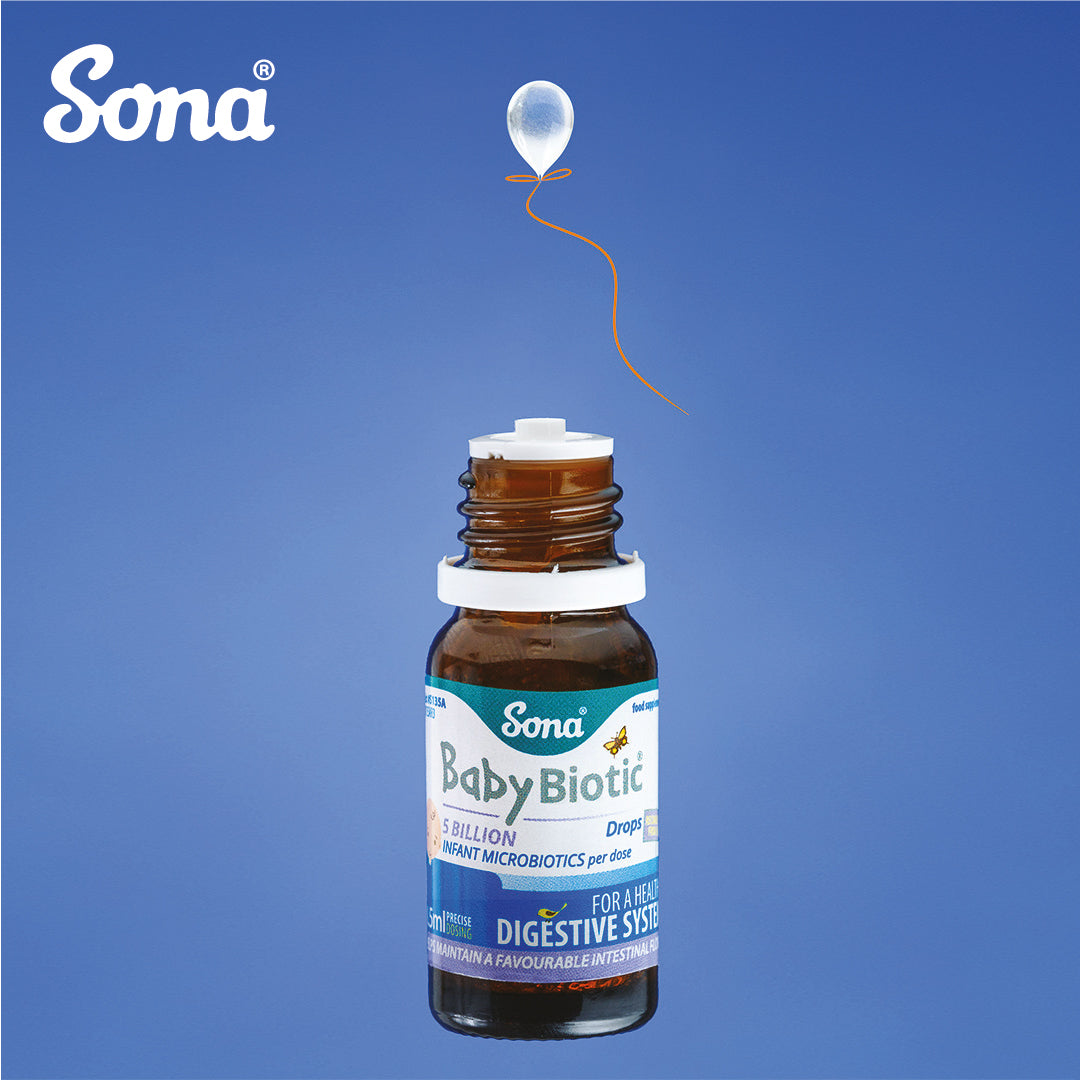
The gut microbiome refers to the collection of microorganisms found in the gut. Among these various microorganisms is bifidobacteria, a group of beneficial bacteria called probiotics which is established in early infancy and plays a critical role in the development and function of the gastrointestinal and immune system of a baby. Not only do probiotic supplements promote a healthy microbiota in babies, but they can also treat various adverse issues including diarrhea, respiratory tract infections, colic, and skin irritation.
In this article you can find:
- What is a probiotic and why should I give my baby probiotics?
- What probiotic should I get for my baby?
- Is this probiotic safe for babies?
What is a probiotic and why should I give my baby probiotics?
Probiotics are a combination of live beneficial bacteria and/or yeasts that are naturally found in the human body. They are a part of the human microbiome, which is a collection of microorganisms that live inside the human body. The most common place linked to beneficial microbes is the gut. The collection of microorganisms found here are known as the gut microbiome.
Supplementing with probiotics can help your baby maintain a healthy community of microorganisms. Probiotics can even help these microorganisms return to a healthy state after being disturbed, for example, after cesarean section delivery, early antibiotic use, and limited breastfeeding. Various health conditions including asthma, allergies, respiratory infections, irritable bowel disease, types 1 diabetes, and obesity can also affect a baby’s gut microbiome.
What probiotic should I get for my baby and how should I give it to them?
Sona BabyBiotic is a food supplement for infants from birth containing 5 billion Bifidobacterium (BB-12®) in each daily dose. This strain of micro-organism has the documented effect, stability and has been tested in numerous clinical trials in infants with proven safety and efficacy. Six drops of Sona Babybiotic should be given to infants from birth daily.
Is this probiotic safe?
The BB-12® probiotic strain is the world's most documented Bifidobacterium. It is described in more than 300 scientific publications out of which more than 130 are published of clinical studies dating back to 1987. Bifidobacterium (BB-12®) has a long history of use and has been tested in clinical trials over more than 25 years. This strain of micro-organism has documented effect and stability and has been tested in numerous clinical trials in infants with proven safety.
References
- Jungersen, M., Wind, A., Johansen, E., Christensen, J., Stuer-Lauridsen, B., & Eskesen, D. (2014). The Science behind the Probiotic Strain Bifidobacterium animalis subsp. lactis BB-12®. Microorganisms, 2(2), 92-110. doi: 10.3390/microorganisms2020092.
- Kligler, B., & Cohrssen, A. (2008). Probiotics. American family physician, 78(9), 1073–1078.
- Martinelli, M., Banderali, G., Bobbio, M., Civardi, E., Chiara, A., & D’Elios, S. et al. (2020). Probiotics’ efficacy in paediatric diseases: which is the evidence? A critical review on behalf of the Italian Society of Pediatrics. Italian Journal Of Pediatrics, 46(1). doi: 10.1186/s13052-020-00862-z.
- Newberry, S. (2012). Probiotics for the Prevention and Treatment of Antibiotic-Associated Diarrhea. JAMA, 307(18), 1959. doi: 10.1001/jama.2012.3507.
- Quin, C., Estaki, M., Vollman, D., Barnett, J., Gill, S., & Gibson, D. (2018). Probiotic supplementation and associated infant gut microbiome and health: a cautionary retrospective clinical comparison. Scientific Reports, 8(1). doi: 10.1038/s41598-018-26423-3.
- Sniffen, J., McFarland, L., Evans, C., & Goldstein, E. (2018). Choosing an appropriate probiotic product for your patient: An evidence-based practical guide. PLOS ONE, 13(12), e0209205. doi: 10.1371/journal.pone.0209205.
- The BB-12® strain – The world’s most documented Bifidobacterium. (2021). Retrieved 3 June 2021, from https://www.chr-hansen.com/en/human-health-and-probiotics/our-probiotic-strains/bifidobacterium-animalis-subsp-lactis-bb-12.
- Zhang, Y., Li, S., Gan, R., Zhou, T., Xu, D., & Li, H. (2015). Impacts of Gut Bacteria on Human Health and Diseases. International Journal Of Molecular Sciences, 16(12), 7493-7519. doi: 10.3390/ijms16047493.
